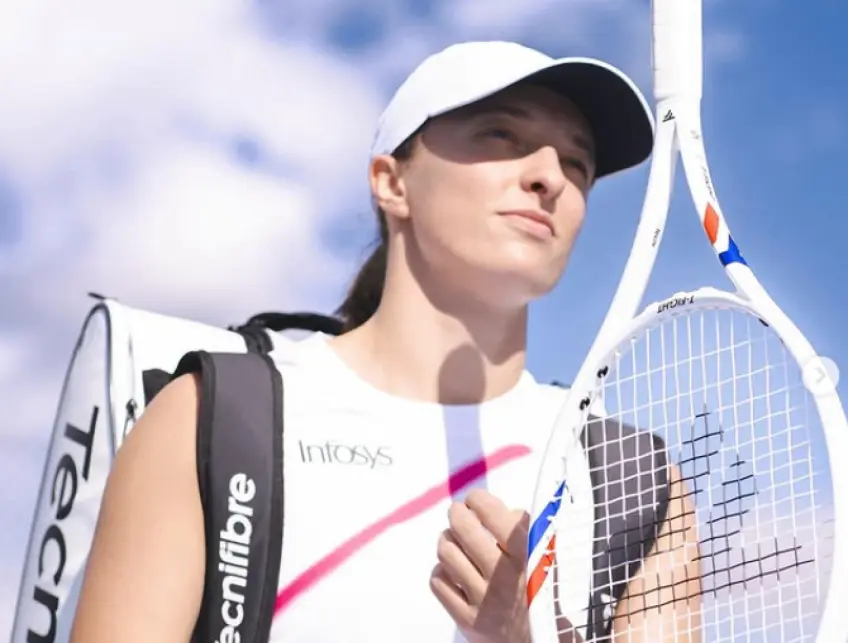
In the fiercely competitive world of professional tennis, where every match tests physical and mental limits, players are now rallying for a cause beyond the baseline: fair compensation. Iga Swiatek, the 23-year-old Polish superstar and world No. 2, has added her voice to a bold initiative by top ATP and WTA players demanding a greater share of Grand Slam profits. As one of the signatories of a letter sent to the Australian Open, Roland Garros, Wimbledon, and the US Open, Swiatek recently shared her perspective on the movement, emphasizing the need for a more equitable financial structure that reflects the players’ pivotal role in the sport’s global spectacle.
The letter, co-signed by luminaries like Novak Djokovic, Jannik Sinner, Carlos Alcaraz, Aryna Sabalenka, and Coco Gauff, calls for a “greater distribution of profits generated by the four pillars of the tour” to benefit the athletes who drive the show. Swiatek, speaking ahead of her preparations for the 2025 clay season, underscored the collective sentiment. “It’s about fairness,” she said, highlighting the disparity between the massive revenues generated by Grand Slams and the prize money awarded. “We’re the ones out there, giving everything, and we just want to be part of the conversation about how the sport grows.” Her comments reflect a broader push for transparency and collaboration, as players seek not only higher payouts but also a voice in decisions shaping their careers.
Swiatek’s involvement is no surprise. A five-time Grand Slam champion, she’s been a vocal advocate for player welfare, previously criticizing the WTA’s grueling schedule for its toll on physical and mental health. Her signature on the letter—joined by all but one of the WTA’s top 11 players, with Elena Rybakina as the notable exception—signals a unified front. The group’s demands extend beyond prize money to include contributions to ATP and WTA welfare programs, aiming to support lower-ranked players who often struggle with the sport’s high costs. “I think that’s going to benefit all the players, not only the top players,” said world No. 8 Zheng Qinwen, echoing Swiatek’s call for a system that uplifts the entire tennis ecosystem.
The Grand Slams, which collectively awarded $254 million in player compensation in 2024, have seen steady prize money increases—2025’s Australian Open alone boosted its purse by 11.56%, with champions earning nearly $2.2 million and first-round losers pocketing $83,000. Yet, players argue that these sums, while substantial, represent a fraction of the tournaments’ soaring profits from ticket sales, broadcasting rights, and sponsorships. Swiatek, who earned $9.9 million in prize money last year, pointed to other sports as a model. “If you look at something like the NBA, players get around 50% of the revenue,” she noted, suggesting tennis could align more closely with such benchmarks. “It’s not about greed—it’s about what’s logical for the sport.”
For Swiatek, the timing of this advocacy feels personal. After a challenging 2024, marked by a one-month doping suspension and a dip to No. 2 behind Sabalenka, she’s rebounded with renewed focus. Her recent withdrawal from the Billie Jean King Cup qualifiers to prioritize training underscores her commitment to peak performance. “Now it’s time for more balance, focusing on myself and my training,” she said, a decision that aligns with her broader push for a sustainable career. The letter’s demands, she believes, could ease financial pressures that force players to overcommit, risking burnout or injury.
The initiative has sparked debate. Some see it as a necessary evolution, with players like Emma Navarro framing it as a quest for “equal treatment” across the sport’s ranks. Others question whether the Slams, steeped in tradition, will bend to pressure. Swiatek remains optimistic but pragmatic. “It’s not going to happen overnight,” she admitted, acknowledging the long-term nature of the fight. “But if we can sit down with the Grand Slams, have real talks about revenue shares, that’s a start.” Her vision includes not just financial gains but structural changes, like involving players in major decisions—a nod to her frustration with unilateral moves like the WTA’s expanded mandatory tournaments.
As Swiatek gears up for Rome and Roland Garros, where she’s a three-time champion, her off-court leadership is as compelling as her forehand. The letter represents a collective stand, but her voice—calm, reasoned, yet unwavering—adds weight to the cause. “We’re not just players; we’re the heart of the game,” she said, a reminder of the human stakes behind the sport’s glamour. With the tennis world watching, Swiatek’s advocacy could reshape the Grand Slams, ensuring the spotlight shines not just on trophies but on the players who earn them.
Leave a Reply